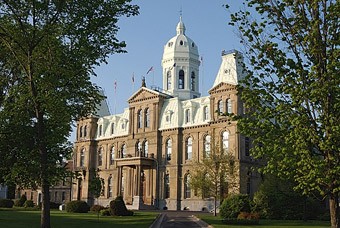Less tax to Ottawa means more autonomy for New Brunswick

This op-ed was published in the New Brunswick Telegraph-Journal on November 28, 2019.
By: Paige MacPherson and Renaud Brossard
New Brunswickers are better suited than Ottawa bureaucrats to make policy decisions for New Brunswick. Yet New Brunswickers pay tremendous taxes to Ottawa, just to have that money funneled back with strings attached. With one realistic change, New Brunswickers could pay lower taxes to Ottawa in exchange for more localized and efficient service delivery – without the federal government meddling.
It’s time for new ideas in New Brunswick to help the province take the reins in its financial decision-making.
Needs vary from province to province. Presumably, the need for hip replacement surgeries is lower in Alberta, where the median age is 36.1 years-old, compared to New Brunswick, where it’s 43.4 years-old. Provinces can be responsive by allocating funding where it matters most.
In 2017, the per-person contribution of personal income taxes from New Brunswickers to Ottawa was $2,962. Ottawa bureaucrats collect that money and will spend roughly $55 billion this year, dishing it back to the provinces through the Canada Health Transfer and Canada Social Transfer. They’re used to fund services such as health care; a constitutionally guaranteed provincial jurisdiction.
That means Ottawa should have no say over health-care delivery.
But therein lies the problem.
When Ottawa sends that money back to the provinces, it comes with strings attached.
Ottawa politicians do not always act in the best interest of New Brunswick. The imposition of Ottawa’s carbon tax is evidence enough.
New Brunswickers could have more independence over provincial decisions if, instead of shuffling so much money to Ottawa and back, the New Brunswick government took responsibility for funding a greater portion of the province’s health, education and social services, in exchange for reduced taxes from Ottawa.
This is already done right next door in Quebec.
While it hasn't cut all the strings attached to Ottawa's funding, the Refundable Quebec Abatement has reduced Ottawa's ability to meddle in Quebec’s business.
In the 1960s, the federal government gave provinces the ability to opt-out of certain federal transfers in exchange for so-called tax points. Quebec was the only province to opt-out. Instead of getting a cheque from Ottawa every year for those programs, Ottawa simply deducts the portion of federal revenues used for those programs from the federal taxes Quebeckers paid.
This freed up room for the province to tax Quebeckers directly for Quebec’s programs, rather than depending on Ottawa. Quebeckers can now claim the Refundable Quebec Abatement on their federal income taxes, amounting to a 16.5 per cent reduction to their federal income tax bill.
New Brunswick would be wise to follow suit. Because when provincial governments rely on federal transfers to provide services such as health care, Ottawa can dictate provincial policy.
This happened in 2016, when the federal government renegotiated its health-care transfer with the provinces, earmarking $11 billion to be used for Ottawa’s priorities. Despite initial opposition, every province ended up signing the deal. Twenty per cent of their health funding was in jeopardy if they didn’t.
In 2018, federal Health Minister Ginette Petitpas Taylor threatened to dock Quebec’s health transfers if the provincial government continued to respect Quebeckers’ right to choose to pay for their own health care. Quebec told Ottawa to back off. The feds haven’t made a peep since.
Considering Ottawa’s track record, we’re giving the federal government an awful lot of power over provincial decisions.
If New Brunswickers took control like Quebeckers and exchanged some federal transfers for lower federal income taxes and more autonomy over provincial program spending, it could mean lower taxes and better service delivery for New Brunswick.
Paige MacPherson is Atlantic Director and Renaud Brossard is Quebec Director of the Canadian Taxpayers Federation.